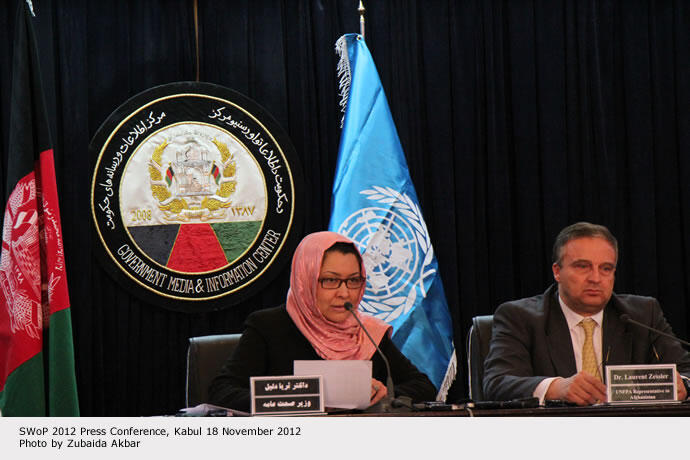Kabul, 18 November 2012.- Dr. Laurent Zessler, UNFPA Representative and HE Dr. Suraya Dalil, Minister of Public Health raise awareness on Family Planning in Afghanistan during the launch of the UNFPA State of the World Population Report 2012 titled "By choice, not by chance: family planning, human rights and development".
"Enabling women to exercise their reproductive rights, including choosing when to become pregnant, enables other rights including health, education and the achievement of a life with dignity" said Dr. Laurent Zessler, UNFPA Afghanistan Representative. "Yet, in Afghanistan only 22 percent of currently married women are using any contraceptive method; though 90 per cent are aware of family planning methods. Investing in family planning pays; it helps reduce poverty, improves health, promotes gender equality, enables adolescents to finish school and increase labour force participation".
According to the Report, increased contraceptive use has reduced globally maternal deaths by 40 per cent, by reducing unintended pregnancies. 30 per cent more maternal deaths could be prevented by fulfilling unmet need for family planning; and spacing pregnancies by three to five years could reduce infant death by 46 per cent in developing countries.
The State of the World Population clearly states that ensuring access to family planning for all women, men and young people, requires a multipronged effort: simultaneously strengthening health systems, introducing or enforcing laws that protect individuals' rights, reducing poverty, challenging harmful traditional practices, eliminating child marriage, ending discrimination, removing logistical impediments and ensuring a broad range of supplies.
"A short birth interval not only has an impact on fertility but is also associated with an increased risk of mortality for mother and baby, particularly when the birth interval is less than 24 months. In Afghanistan almost one in three births occurs less than 24 months after the preceding birth. This reality brings severe consequences on the health of women and children in our country" said HE Dr. Suraya Dalil, Minister of Public Health. "The Afghanistan Mortality Study 2010 shows us that the use of modern family planning methods has doubled from 10 percent in 2003 to 22 percent but much more needs to be done to assure reproductive health right to all women in Afghanistan. The Government has set itself the target of increasing the Contraceptive Prevalence Rate to 40% by 2016", added Dr. Dalil.
Read/Download Press Release
STATE OF THE WORLD POPULATION REPORT 2012 - Engliah


